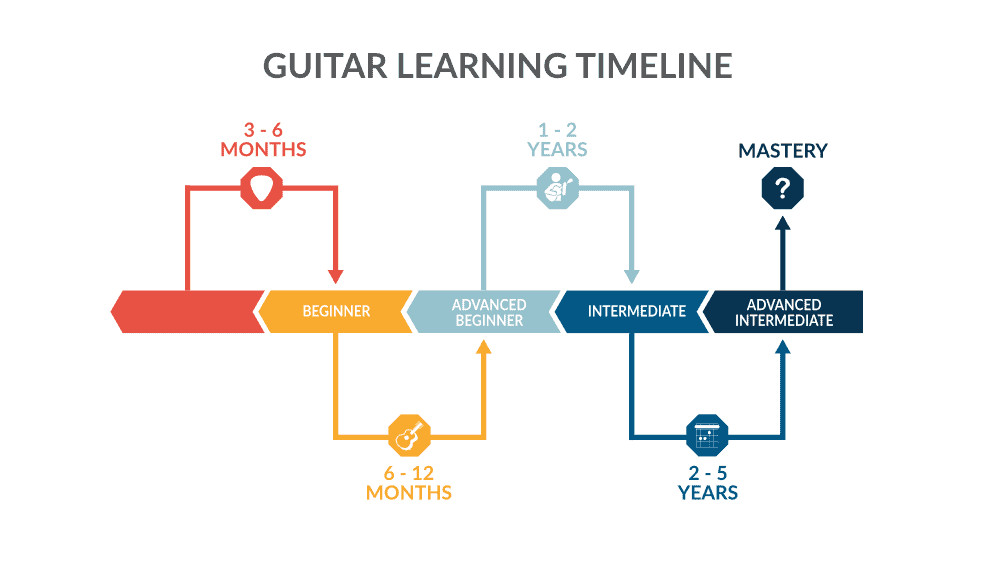How Quickly Can I Learn To Play Guitar? That’s a question many aspiring guitarists ask, and at guitarplayers.net, we understand your eagerness to start making music. While there’s no magic formula, we can provide a realistic guitar learning timeline and helpful advice to accelerate your journey. With consistent practice, the right resources, and a supportive community, you can unlock your musical potential and enjoy the rewarding experience of playing guitar.
1. What is a Realistic Guitar Learning Timeline?
There’s no one-size-fits-all answer to how long it takes to learn guitar, as everyone progresses at their own pace. However, understanding typical milestones can help you set realistic expectations and stay motivated on your guitar journey.
 Guitar Learning Timeline
Guitar Learning Timeline
1.1. Beginner Guitar Phase: 3-6 Months
In the initial 3-6 months, you’ll focus on the fundamentals of playing guitar. This beginner phase involves building calluses on your fingertips, developing hand strength and coordination, and learning essential techniques like basic chords and strumming patterns. While it may feel challenging at times, remember that this foundation is crucial for future progress on the guitar. Many students feel that its harder than it looks at this stage.
1.2. Advanced Beginner Guitar Phase: 6 Months to 1 Year
After the initial excitement of learning guitar, you might experience a plateau where progress seems slower. This advanced beginner phase involves refining your technique, learning more complex chords and strumming patterns, and exploring simple melodies. Don’t get discouraged if you don’t see immediate results; consistent practice will help you break through the plateau and continue improving.
1.3. Intermediate Guitar Phase: 1-2 Years
The intermediate phase marks a significant step forward in your guitar playing journey. During this stage, you’ll master barre chords, improve your chord transitions, and develop a solid sense of rhythm. You’ll also start exploring scales, learning lead guitar techniques, and expanding your musical repertoire. This is the time to buckle down and really dig in to hone your skills.
1.4. Advanced Intermediate Guitar Phase: 2-5 Years
At the advanced intermediate level, you’ll have a strong command of the guitar and be able to play a wide variety of songs and styles. You’ll develop your own unique playing style, improvise solos, and even start writing your own music. This phase is about refining your skills, exploring new musical horizons, and truly making the guitar an extension of your creative expression. You’ve realized that guitar is a journey, not just a hobby.
2. What Factors Influence How Quickly You Learn Guitar?
Several factors can affect your guitar learning timeline, including your practice habits, learning style, and access to quality resources. Understanding these influences can help you optimize your learning approach and accelerate your progress on the guitar.
2.1. Practice Consistency for Guitar Mastery
Regular, consistent practice is the most crucial factor in learning guitar quickly. Aim for at least 30 minutes of focused practice each day, rather than sporadic, longer sessions. Consistent practice helps build muscle memory, develop coordination, and reinforce the concepts you’re learning.
2.2. Effective Guitar Practice Techniques
The quality of your practice is just as important as the quantity. Focus on practicing with intention, breaking down complex passages into smaller, manageable chunks, and using a metronome to improve your timing. Additionally, incorporate active listening, where you analyze your playing and identify areas for improvement.
2.3. Personalized Guitar Learning Style
Everyone learns differently, so it’s essential to find a learning style that suits you. Some people prefer visual learning, while others learn best through auditory or kinesthetic methods. Experiment with different approaches, such as online lessons, private instruction, or self-study, to discover what works best for you.
2.4. The Importance of Guitar Instruction
While self-teaching is possible, having a qualified instructor can significantly accelerate your progress. A good teacher can provide personalized guidance, identify and correct bad habits, and offer valuable insights into music theory and technique.
2.5. Setting Realistic Guitar Goals
Set achievable goals to stay motivated and track your progress. Start with small, manageable goals, such as learning a new chord each week or mastering a simple song. As you progress, gradually increase the difficulty of your goals to continue challenging yourself.
3. How to Optimize Your Guitar Practice for Faster Learning?
Effective practice is essential for accelerating your guitar learning journey. By incorporating proven techniques and strategies, you can maximize your practice time and see results faster.
3.1. Structured Guitar Practice Sessions
Create a structured practice routine that includes warm-ups, technical exercises, chord practice, song learning, and improvisation. A well-structured routine ensures you cover all essential areas and make consistent progress.
3.2. Warm-up Exercises for Guitarists
Start each practice session with warm-up exercises to prepare your hands and fingers for playing. Simple exercises like scales, arpeggios, and finger stretches can improve dexterity, coordination, and blood flow.
3.3. Using a Metronome for Guitar Timing
A metronome is an indispensable tool for developing accurate timing and rhythm. Practice playing chords, scales, and songs with a metronome to ensure you’re playing in time and maintaining a consistent tempo.
3.4. Breaking Down Complex Guitar Passages
When learning a challenging song or solo, break it down into smaller, more manageable sections. Practice each section slowly and repeatedly until you can play it flawlessly before gradually increasing the tempo.
3.5. Active Listening for Guitar Improvement
Record yourself playing and listen critically to identify areas for improvement. Pay attention to your timing, tone, and technique, and make adjustments accordingly. Active listening helps you develop a more discerning ear and refine your playing.
4. What are the Best Resources for Learning Guitar Quickly?
Access to quality resources is essential for efficient guitar learning. From online lessons to private instruction, a variety of options are available to suit different learning styles and budgets. At guitarplayers.net, we have a wide array of resources for all levels.
4.1. Online Guitar Lessons
Online guitar lessons offer a convenient and affordable way to learn at your own pace. Numerous websites and apps provide structured courses, video tutorials, and interactive exercises for all skill levels.
4.2. Private Guitar Instruction
Private guitar lessons provide personalized instruction and guidance from an experienced teacher. A private instructor can assess your strengths and weaknesses, tailor lessons to your specific needs, and provide valuable feedback on your playing.
4.3. Guitar Learning Apps
Guitar learning apps offer interactive exercises, games, and song libraries to make learning fun and engaging. Many apps provide personalized feedback and track your progress, helping you stay motivated and on track.
4.4. Guitar Tablature and Sheet Music
Guitar tablature (tab) and sheet music provide written notations of songs and solos, allowing you to learn and play your favorite tunes. Tab is a simplified notation system that shows you which frets and strings to play, while sheet music provides a more detailed representation of the music.
4.5. Guitar Communities and Forums
Joining a guitar community or forum can provide valuable support, encouragement, and advice from fellow guitarists. Online communities offer a place to ask questions, share your progress, and connect with other musicians.
5. How Does Guitarplayers.net Help You Learn Guitar Faster?
Guitarplayers.net is your ultimate resource for learning guitar quickly and effectively. We offer a comprehensive range of tools, resources, and a supportive community to help you achieve your musical goals.
5.1. Extensive Library of Guitar Lessons
Guitarplayers.net boasts an extensive library of guitar lessons for all skill levels, from beginner to advanced. Our lessons cover a wide range of topics, including chords, scales, techniques, song learning, and music theory.
5.2. Expert Guitar Instructors
Our team of experienced guitar instructors provides high-quality lessons and guidance. Our instructors are passionate about teaching and committed to helping you achieve your musical goals.
5.3. Personalized Guitar Learning Paths
Guitarplayers.net offers personalized learning paths tailored to your specific skill level and musical interests. Our learning paths guide you through a structured curriculum, ensuring you learn the right things in the right order.
5.4. Interactive Guitar Exercises
Our interactive exercises provide a fun and engaging way to practice your guitar skills. Our exercises include chord practice, scale practice, rhythm training, and ear training.
5.5. Guitar Community and Forums
Join our vibrant community of guitarists to connect with fellow musicians, ask questions, and share your progress. Our forums provide a supportive and encouraging environment for guitar learners of all levels.
6. What are Common Pitfalls to Avoid When Learning Guitar?
Avoiding common mistakes can significantly accelerate your guitar learning journey. By being aware of these pitfalls and taking steps to avoid them, you can save time, frustration, and develop solid playing habits.
6.1. Neglecting Guitar Fundamentals
Don’t rush into learning complex techniques before mastering the fundamentals. A solid foundation in chords, scales, and rhythm is essential for long-term progress.
6.2. Practicing Guitar Without a Goal
Practice with intention and focus. Set specific goals for each practice session, such as learning a new chord, mastering a difficult passage, or improving your timing.
6.3. Ignoring Guitar Ergonomics
Maintain good posture and hand position while playing to avoid injuries. Take breaks frequently to stretch and relax your muscles.
6.4. Comparing Yourself to Other Guitarists
Focus on your own progress and celebrate your achievements. Comparing yourself to others can lead to discouragement and hinder your motivation.
6.5. Giving Up Too Easily on Guitar Playing
Learning guitar takes time and effort. Don’t get discouraged by setbacks. Stay persistent, practice consistently, and enjoy the journey.
7. What are Some Quick Wins for Beginner Guitarists?
While mastering the guitar takes time, beginner guitarists can achieve some quick wins to stay motivated and build confidence. These simple accomplishments provide a sense of progress and encourage you to continue learning.
7.1. Learning Easy Guitar Chords
Start by learning a few basic chords, such as G, C, D, and Em. These chords are used in countless songs and will allow you to start playing simple tunes right away.
7.2. Playing Simple Guitar Songs
Once you know a few chords, learn to play some easy songs that use those chords. Many popular songs have simple chord progressions that are perfect for beginners.
7.3. Mastering Basic Guitar Strumming Patterns
Learn a few basic strumming patterns to add rhythm and dynamics to your playing. Simple down-up strumming is a great place to start.
7.4. Playing Guitar Melodies on a Single String
Learn to play simple melodies on a single string to develop your finger dexterity and ear training skills. Nursery rhymes and folk songs are great options for this exercise.
7.5. Recording Yourself Playing Guitar
Record yourself playing and listen back to identify areas for improvement. This exercise helps you develop a more critical ear and refine your playing.
8. How to Stay Motivated on Your Guitar Learning Journey?
Staying motivated is crucial for long-term success in learning guitar. Here are some tips to help you stay inspired and engaged on your musical journey.
8.1. Set Realistic Guitar Goals and Track Your Progress
Set achievable goals and track your progress to see how far you’ve come. This provides a sense of accomplishment and motivates you to keep learning.
8.2. Find a Guitar Learning Buddy
Learning with a friend or fellow guitarist can provide support, encouragement, and accountability. Practice together, share tips, and celebrate each other’s successes.
8.3. Join a Guitar Community or Band
Joining a guitar community or band provides a sense of belonging and allows you to collaborate with other musicians. Playing with others can also improve your timing, rhythm, and improvisation skills.
8.4. Attend Guitar Concerts and Workshops
Attending guitar concerts and workshops can inspire you and expose you to new musical ideas. Seeing professional guitarists perform can motivate you to improve your own playing.
8.5. Reward Yourself for Guitar Achievements
Celebrate your achievements, no matter how small. Treat yourself to a new guitar accessory, a concert ticket, or a special practice session.
9. What are the Long-Term Benefits of Learning Guitar?
Learning guitar offers numerous long-term benefits beyond musical skills. Playing guitar can improve your cognitive function, reduce stress, and enhance your creativity.
9.1. Improved Cognitive Function from Guitar Playing
Playing guitar requires coordination, memory, and problem-solving skills, which can improve your cognitive function. Studies have shown that playing a musical instrument can enhance brain plasticity and protect against age-related cognitive decline. According to research from the Berklee College of Music, in July 2025, music training enhances cognitive skills such as memory and attention.
9.2. Stress Reduction Through Guitar
Playing guitar can be a relaxing and therapeutic activity that helps reduce stress and anxiety. The act of playing music can release endorphins, which have mood-boosting effects.
9.3. Enhanced Creativity with Guitar
Playing guitar can unlock your creativity and allow you to express yourself in new ways. Learning to improvise, compose, and arrange music can stimulate your imagination and enhance your artistic abilities.
9.4. Increased Self-Esteem from Guitar
Mastering the guitar can boost your self-esteem and confidence. As you improve your skills and perform in front of others, you’ll develop a sense of accomplishment and pride.
9.5. Lifelong Enjoyment of Guitar
Learning guitar is a gift that keeps on giving. Playing guitar can provide a lifetime of enjoyment, whether you’re playing for yourself, with friends, or in a band.
10. Frequently Asked Questions (FAQs) About Learning Guitar
Here are some frequently asked questions about learning guitar, along with helpful answers to guide you on your musical journey.
10.1. Is it Hard to Learn to Play Guitar?
Learning guitar can be challenging, but it’s also incredibly rewarding. With consistent practice and the right resources, anyone can learn to play.
10.2. How Long Does it Take to Learn Basic Guitar?
You can learn the basics of guitar, such as chords and strumming, in a few months with consistent practice.
10.3. Can I Teach Myself to Play Guitar?
Yes, you can teach yourself to play guitar using online resources, books, and apps. However, having a qualified instructor can accelerate your progress.
10.4. What is the Easiest Way to Learn Guitar?
The easiest way to learn guitar is to start with the fundamentals, practice consistently, and find a learning style that suits you.
10.5. What are the Best Guitar Brands for Beginners?
Some of the best guitar brands for beginners include Yamaha, Fender, and Epiphone. These brands offer quality instruments at affordable prices.
10.6. How Much Should I Practice Guitar Each Day?
Aim for at least 30 minutes of focused practice each day. Consistent practice is more important than the length of each session.
10.7. What are the Most Important Things to Learn First on Guitar?
The most important things to learn first on guitar are basic chords, strumming patterns, and how to read tablature.
10.8. How Do I Tune My Guitar?
You can tune your guitar using a digital tuner, a tuning app, or by ear using a reference pitch.
10.9. How Do I Change Guitar Strings?
You can change guitar strings by following a step-by-step tutorial or by having a professional do it for you.
10.10. How Do I Care for My Guitar?
Care for your guitar by cleaning it regularly, storing it in a case, and keeping it properly humidified.
Ready to start your guitar journey? Visit guitarplayers.net today for lessons, reviews, and a supportive community. Address: 1140 Boylston Street, Boston, MA 02215, United States. Phone: +1 (617) 747-2261. Website: guitarplayers.net.


